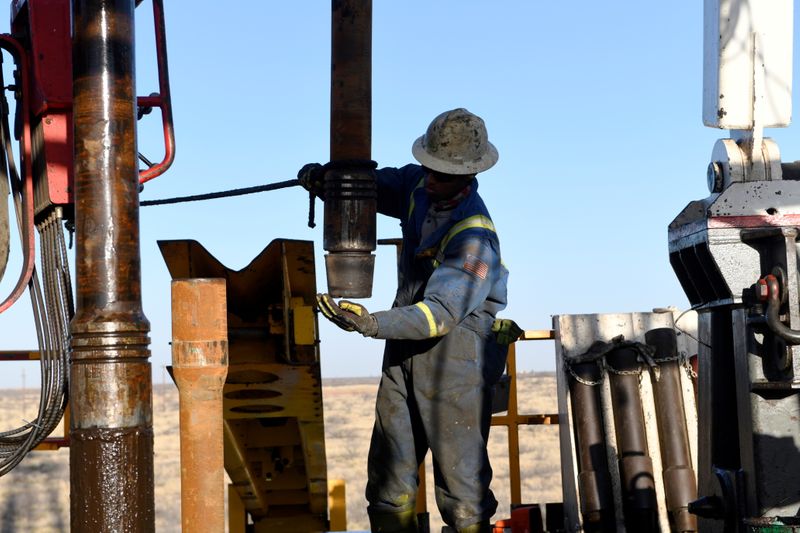By Liz Hampton
DENVER (Reuters) - U.S. oil producers are struggling to find enough crews, vehicles and equipment to take advantage of rising global demand and a seven-year high in crude prices, say executives at oilfield service firms.
The problems are preventing the world's top oil producer and consumer, the United States, from responding to higher prices and could mean it takes longer for global output to match demand recovering from the coronavirus pandemic. That would result in oil firms draining inventories and in turn contribute to higher prices.
Higher energy prices are fueling consumer inflation, which last month hit 6.2%, the highest in 30 years. The Biden administration has urged oil producers to pump more oil, signaling it might release U.S. emergency stockpiles if prices keep rising.
The drillers and service firms that bring new oil and gas to market are confronting shortages and delays in everything from trucks, electronics, pumps and skilled workers. Workarounds so far have kept a crunch at bay, but shortages are hitting oilfield service results and could short-circuit U.S. production gains early next year, they said.
Logistics snags have cut access to specialized steel, submersible pumps that boost well pressures, and pickups that ferry workers and equipment. U.S. oil production figures show output remains 1.8 million barrels per day (bpd) below the peak reached nearly two years ago while global demand is forecast to exceed pre-pandemic levels by June.
Nearly two-thirds of Texas business executives polled by the Dallas Federal Reserve Bank recently disclosed difficulties getting needed supplies, with nearly half saying problems have become worse. It could take seven to 12 months to ease, said roughly half, with 18% expecting shortages to last more than a year.
'GETTING WORSE'
"We'll come to a point where we can't handle additional work with existing inventory," said Brad James, chief executive of driller Enterprise Offshore Drilling. "The problems we're seeing are going to get worse," he predicted.
Pressure on supplies is not as bad as it might have been because many shale oil producers have pledged to restrain new spending for output and instead use cash generated by high prices to pay dividends and reduce debt.
Oil services firms are struggling, however, even though many producers are standing pat. Requests for some orders to supply oil companies have gone unanswered, said James, and lead-times for certain drilling equipment are so far out that Enterprise has resorted to cannibalizing rigs idled off the Louisiana coast to keep existing rigs running.
(For a chart on worker shortages and pay, click here: https://graphics.reuters.com/OIL-LOGISTICS/klpykdmzxpg)
“Without significant additional investment, land contract drillers are at their limit with the rigs they can deploy to satisfy the requirements of today's multiple-well, very long-lateral drilling,” said Richard Spears, vice president of oilfield consultancy Spears & Associates.
Equipment shortages and lengthy delays are driving up prices for what is available. Denver, Colorado-based oil service firm Liberty Oilfield Services (NYSE:LBRT) took a $12 million hit to third quarter earnings because costs rose faster than it was able to raised prices, its CEO said.
SIX MONTHS FOR A TRUCK
Fredrick Klaveness, CEO of NLB Water LLC, which developed a membrane-driven technology to treat and recycle wastewater from oil and gas production, has been waiting since June for $200,000 worth of orders that have not shipped because suppliers are also waiting on certain components.
"One small piece of the puzzle stops everything," said Klaveness. If the ordered membrane modules are not received in time, NLB may lose an important contract. "Parts probably worth less than $5,000 are holding up the entire order. Those parts are not microchips or something fancy, but basic components made out of materials like stainless steel and titanium."
A heavy duty Dodge Ram pickup he ordered in June took five months to arrive, Klaveness said. His workarounds to keep business flowing include buying supplies from Canada and at one point, picking up galvanized steel from several Home Depot (NYSE:HD) stores in Colorado and hauling it to West Texas where it was not available.
RIPPLE EFFECT
The electronic components shortage hurting the auto and computer industry is troubling renewable energy as well as oil and gas. That is affecting companies digitalizing operations and adding renewable power to lower greenhouse gas emissions.
Firms that convert pipeline compressor stations to run on electric motors instead of natural gas are finding parts in short supply, said energy consultant Spears.
Ru Schaefferkoetter, CEO of solar pump firm Trido Solutions, said basic materials such as steel and aluminum can be hard to find. She worries that supplies could get tighter as the Biden administration incentivizes solar development.

President Joe Biden's Infrastructure Bill, which could be signed into law on Monday, includes funding to upgrade power infrastructure and expand renewable energy through a new Grid Authority.
“There are a growing number of people laid off on solar projects because there are no panels,” said John Berger, CEO of Sunnova, at a recent Kansas City Federal Reserve Conference. An “extreme shortage of electricians,” is another concern, he said.